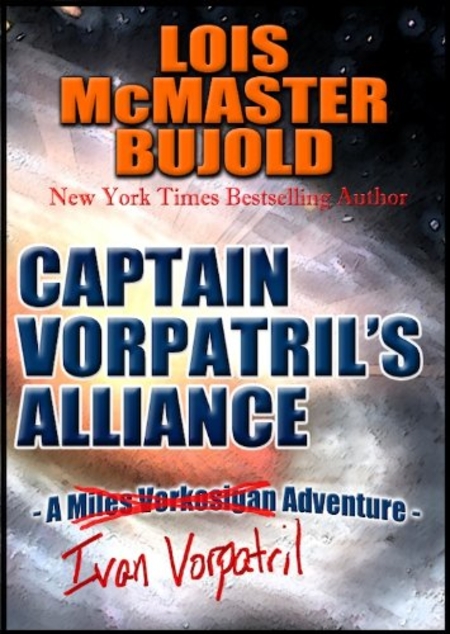
And here we are at the last chapter of my Vorkosigan revisitation – yes, there are two more stories, The Flowers of Vashnoi and Gentleman Jole and the Red Queen, which were published after I began blogging, so you can follow the links if you are interested – but as far as the older books are concerned, this is it 🙂 and I can’t hide my sadness at the thought I will have once again to say goodbye to the world and characters I enjoy so much.
Cryoburn is not one of my favorite Miles stories, although it’s a nice one that hits all the usual themes (and a few new ones as well) while moving smoothly along: still, like it happened with a couple of its predecessors, I can’t shake the feeling that Bujold has said all she wanted or needed to say about Miles & Co. and that the famous forward momentum, her main character’s defining element, is petering out.
In this novel our energetic Imperial Auditor is on the planet of Kibou-daini to attend a conference on cryonics, the planet’s major industry: here people who are afflicted by conditions for which there is no treatment yet, or simply waiting for a cure against aging, choose to be cryo-preserved while waiting for the solution to their problems. The mega corporations offering such services have come with time to gather considerable political power and are of course seeking to extend it beyond the planetary limits. Miles’ covert goal is to investigate what looks like a corporate financial takeover aimed at the Barrayaran empire, and at the start of the novel we see him in a bad state, drugged and wandering through the catacombs where frozen people wait to be reawakened. It’s a chilling and unsettling beginning, one that throws you straight into the middle of things with no knowledge of what has transpired, not unlike disoriented and hallucinating Miles.
Luckily for him, he meets twelve-year old Jin, a boy whose anti-corporation activist mother was frozen because of alleged health problems: Jin has been living on the roof of a building where many of Kibou-daini’s dispossessed dwell, and he kindly offers Miles a shelter where the Auditor is able to come back to his senses and then launch into a very Milesian campaign against the evil corporations and their goals.
Cryoburn feels somewhat different from the usual Miles caper, and I’ve come to believe that it’s because there is no immediate danger to his world or the people he cares about here, apart from the scam he’s come to break down and that looks more like an inconvenience than anything else. In his previous adventures he was laboring for far higher stakes, like issues close to his heart, to Barrayar’s interests or related to his survival, while here the whole situation has the flavor of a job – a well done job, granted, but nothing so thrilling as what happened in the past, despite a few intriguing goings-on.
The Miles Vorkosigan we meet in Cryoburn is a more sedate person as well, which is unsurprising since he’s now 38 years old, a father of four and well-established in his role as Auditor. Still I do miss the old Miles and his mad antics, even more so when they manage to surface as a mere shadow of the past ones – and if faithful Armsman Roic is always ready to try and keep his liege lord away from trouble, those glimpses feel more like nostalgic echoes of what was, and end up coating this story with a thin layer of regret, at least for me.
On the positive side, this quieter but more assertive Miles is a joy to behold when he deals with young Jin and his sister: it’s clear from those interactions that he had ample practice with his own children and that he’s now able to relate to young people with tact and kindness – a side of him we had not seen before and which rounds his overall character in a nice, but unsurprising way considering the parenting example he could draw inspiration from…
What makes this book interesting is the underlying theme of life and death, and the impermanence of both in light of cryo-preservation techniques, not to mention the political implications that come from the individuals’ voting power handed down to the corporations while they lie frozen, which sounds quite crazy. There is also a thought-provoking question about the dubious advantage of waking up, decades after one was frozen, to find the world so changed that the returnees are unable to find their place back in it. And all of the above takes a special significance for Miles since he was indeed technically dead in the cryo-chamber where the Dendarii stowed him in Mirror Dance, and he had to walk a long road to a recovery that was far from complete.
As light and fairly amusing as Cryoburn is, it does pack an unexpected punch in the end – a very abrupt end brought on by three words that leave Miles as shell-shocked as the reader. If you read the book you know what I’m talking about… And both shock and the ensuing grief at those words are compounded by the short drabbles Bujold employs as a sort of coda to that staggering revelation, the event seen through the eyes of some of the characters we have come to know and love: more than Miles’ it was Gregor’s point of view that brought me to tears. Not something I would usually associate with a Vorkosigan novel….
My Rating: 














You must be logged in to post a comment.